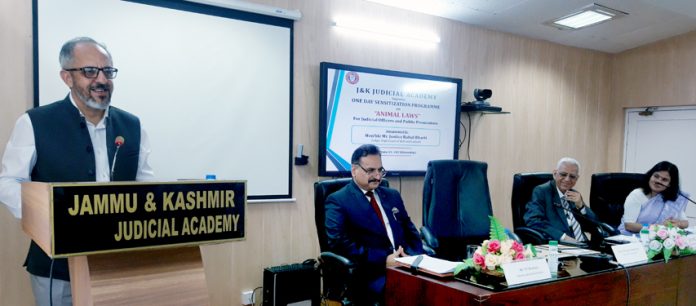JAMMU: J&K Judicial Academy organized one day Sensitization Workshop on ‘Animal Laws’ for judicial officers and prosecuting officers of Jammu Province at Judicial Academy, Jammu.
The workshop was held under the patronage of Justice N Kotiswar Singh, Chief Justice, High Court of Jammu & Kashmir and Ladakh, (Patron-in-Chief, J&K Judicial Academy) and guidance of Justice Sindhu Sharma, Chairperson, Governing Committee for J&K Judicial Academy and Justice Vinod Chatterji Koul, Justice Javed Iqbal Wani and Justice Wasim Sadiq Nargal, members of Governing Committee.
The training programme was inaugurated by Justice Rahul Bharti, Judge, High Court of J&K and Ladakh in presence of D.C. Raina, Advocate General, UTs of J&K and Ladakh.
Gauri Maulekhi, a leading animal welfare laws expert was the resource person in the workshop. The training programme was conducted by Y.P. Bourney, Director, J&K Judicial Academy.
Justice Rahul Bharti, in his inaugural address, emphasised that purpose of law is to bring humanness out of a humans so that the society stays in peace with the environment and thereby evolves itself. He laid emphasis on how revered the animals are for their own existence.
Animals are given rights to be next to the Gods just as humans and their supremacy is well mentioned in our religious books, he added. He gave illustrations from his various real-life experiences and discussed various case laws during his deliberation. He underlined the purpose of holding such training programmes to enhance knowledge of Judicial and other law Officers relating to the laws and to remove inhibitions while applying the provisions thereof in their day-to-day work.
D.C. Raina, in his special remarks, said that those who are well versed with customs and cultures of their religion know that God has always chosen one animal with them and this states the stature of animals. He stated that animals may be less wise but they are not senseless and our culture as well as our ecology is incomplete without them.
He added that animals are the integral and inseparable part of our society. He said that we have several laws and Acts relating to animals but all those are not sufficient and we all have to contribute towards welfare of animals by introducing animal-friendly practices for dealing with cases of cruelty in a time bound manner.
Y.P. Bourney, Director, J&K Judicial Academy, presented the welcome address and gave an overview of the programme. He underlined that the human association with the animals perhaps is as old as the human civilization itself. Animals occupy a very crucial space in human existence. He added that with the change in times, bond between humans and animals has grown deeper and deeper. Not only that, we have a rich culture of not only protecting and preserving some species but also worshipping some of the species of animals. He highlighted that it is important for each and every-one of us to have clear understanding about laws and the legal provisions in vogue for protection of animals from wanton acts of cruelty.
Vote of thanks was proposed by Rajni Sharma, Special Mobile Magistrate (T), Jammu.
In the technical sessions, the resource person Gauri Maulekhi gave an introduction about animal protection laws and prevention of Cruelty to Animal Act, 1960 using a PowerPoint Presentation. She said that the mindless hunting, poaching and killing of animals for commercial exploitation in the recent times have not only led to the new challenges for humanity to preserve the much-needed ecological balance but also poses a threat to some species of extinction. The price tag, transportation by all available means, import/export etc. are some of the very aspects which attract the attention of one and all.
The resource person also deliberated upon the rules regarding transport and slaughter of animals and discussed various case studies with the participants. They emphasised on the need to sensitize the public regarding cruelty to animals and its ill effects so that it can be prevented.
Later, an interactive session was held during which the participants deliberated and discussed various aspects of the subject topic and raised queries which were addressed satisfactorily by the resource person.


